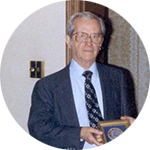Fred Inbau
- Principal founder, Past President and Chairman Emeritus; Board Member, 1966-1997; John Henry Wigmore Professor of Law Emeritus, Northwestern University School of Law, Chicago; former Director,
- Chicago Police Scientific Crime Detection Laboratory. Author of books on interrogation, use of the polygraph, and criminal law.

